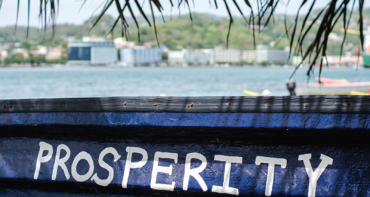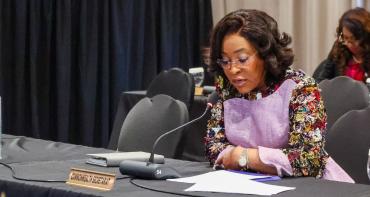The modern Commonwealth of Nations was born in 1949 when the London Declaration was signed by eight countries. The declaration recognised the eight countries as independent and equal members of the Commonwealth, with King George VI as a symbolic head of the association.
Many other landmark declarations have come out of Commonwealth Heads of Government Meetings (CHOGM) over the past 70 years.
Download the Commonwealth Declarations Booklet or explore the list of Declarations below.
Declaration signed by the five Prime Ministers, 1944
The 1949 London Declaration was not the first Commonwealth Declaration. A version of the Commonwealth existed in a different form before 1949. In 1945 after World War Two, 5 Prime Ministers signed a declaration calling for a worldwide organisation to maintain peace and security, with the power and authority to prevent aggression and violence.
London Declaration, 1949
India became independent in 1947. India wanted to become a republic which didn't owe allegiance to the British king or queen, but it also wanted to stay a member of the Commonwealth. At a Commonwealth Prime Ministers meeting in London in 1949, the London Declaration said that republics and other countries could be part of the Commonwealth. The modern Commonwealth of Nations was born.
Declaration by Commonwealth Prime Ministers, 1951
Recognised that the peace and prosperity of the free world could not be assured while millions live in poverty.
Declaration of Commonwealth Principles, 1971
Proclaimed that expanded human understanding and understanding among nations will help the elimination of discrimination based on differences of race, colour or creed.
Lusaka Declaration on Racism and Racial Prejudice, 1979
Proclaimed desire to achieve equal rights for all citizens regardless of race, colour, sex, creed or political belief.
Melbourne Declaration, 1981
Re-asserted the Commonwealth’s principles of economic justice in that gross inequality of wealth and opportunity are fundamental sources of tension and instability in the world.
Goa Declaration on International Security, 1983
Asserted the promotion of peace, disarmament and the resolution of disputes through negotiation in response to the readiness of nations to resort to the illegal use of force.
Nassau Declaration on World Order, 1985
Recognised the United Nations as the central instrument of international co-operation for development, peace and collective security.
Vancouver Declaration on World Trade, 1987
A call to develop a more open, viable and durable multilateral trading system to promote growth and development in response to rising global protectionist pressures.
Langkawi Declaration on the Environment, 1989
Commitment to achieving sustainable economic development through collective and national action whilst confronting critical environmental problems.
Harare Declaration, 1991
Charting a course to take the Commonwealth into the next century which included a ten point pledge listing areas for priority action.
Ottawa Declaration on Women and Structural Adjustment, 1991
Endorsing a broader approach to economic adjustment to include an emphasis on social equity and economic growth as well as efficiency.
Millbrook Commonwealth Action Programme on the Harare Declaration, 1995
Adoption of a Commonwealth action programme to fulfil more effectively the commitments in the Harare Declaration.
Edinburgh Economic Declaration, 1997
Advocated that special measures were needed to help the integration of countries, especially small states and least developed countries to address uneven development.
Fancourt Declaration on Globalisation and People-Centred Development, 1999
Declaration on channelling the forces of globalisation towards the elimination of poverty and the empowerment of human beings.
Coolum Declaration on the Commonwealth in the 21st Century: Continuity and Renewal, 2002
A renewal of commitment to the values and principles shared by Commonwealth countries in the 21st century.
Aso Rock Declaration on Development and Democracy: Partnership for Peace and Prosperity, 2003
A commitment to strengthen development and democracy, through partnership for peace and prosperity.
Malta Declaration on Networking the Commonwealth for Development, 2005
A proclamation that shared values, institutions and conventions provide a platform on which to build and consolidate the foundations of democracy in our societies.
Kampala Declaration on Transforming Societies to Achieve Political, Economic and Human Development, 2007
Reaffirmation of the Commonwealth’s commitment to transforming societies to achieve political, economic and human development.
Climate Change Declaration, 2009
Proposed that climate change presents an undisputed threat to the security, prosperity, economic and social development of people.
Declaration of the Port of Spain, 2009
Acknowledged the key role of Commonwealth partnerships in forging a more sustainable and equitable future for all people.
Declaration on Young People, 2009
Recognition of the role and active contributions of young people in promoting development, peace and democracy, and in protecting and promoting other Commonwealth values.
Perth Declaration on Food Security Principles, 2011
Reaffirmed the right of everyone to have access to safe, sufficient and nutritious food, consistent with the growing realisation of the right to adequate food in the context of national food security.
Magampura Declaration on Commitment to Young People, 2013
Recognition that investing in young people and placing them at the centre of sustainable and inclusive development is the foundation for a prosperous and equitable tomorrow.
Colombo Declaration on Sustainable, Inclusive and Equitable Development, 2013
An agreement that the achievement of growth with equity and inclusivity must be one of the main policy priorities for the Commonwealth.
Commonwealth Cyber Declaration, 2018
Recognised the potential for a free, open, inclusive and secure cyberspace to promote economic growth for all communities and help to achieve the Sustainable Development Goals across the Commonwealth.
Declaration on the Commonwealth Connectivity Agenda for Trade and Investment, 2018
Stressed the importance of international trade and investment in boosting employment and income in Commonwealth countries and helping them achieve the Sustainable Development Goals.
Declaration on Sustainable Urbanisation, 2022
Acknowledging that CHOGM 2022 is taking place against the backdrop of the global COVID-19 pandemic that has had significant consequences for cities and local governments across all Commonwealth member countries.
Kigali Declaration on Child Care and Protection Reform, 2022
Recognising that the Commonwealth accounts for 60% of the world’s youth population. Recognising that the socio-economic impact of the COVID-19 pandemic on children will be both immediate and lifelong.



